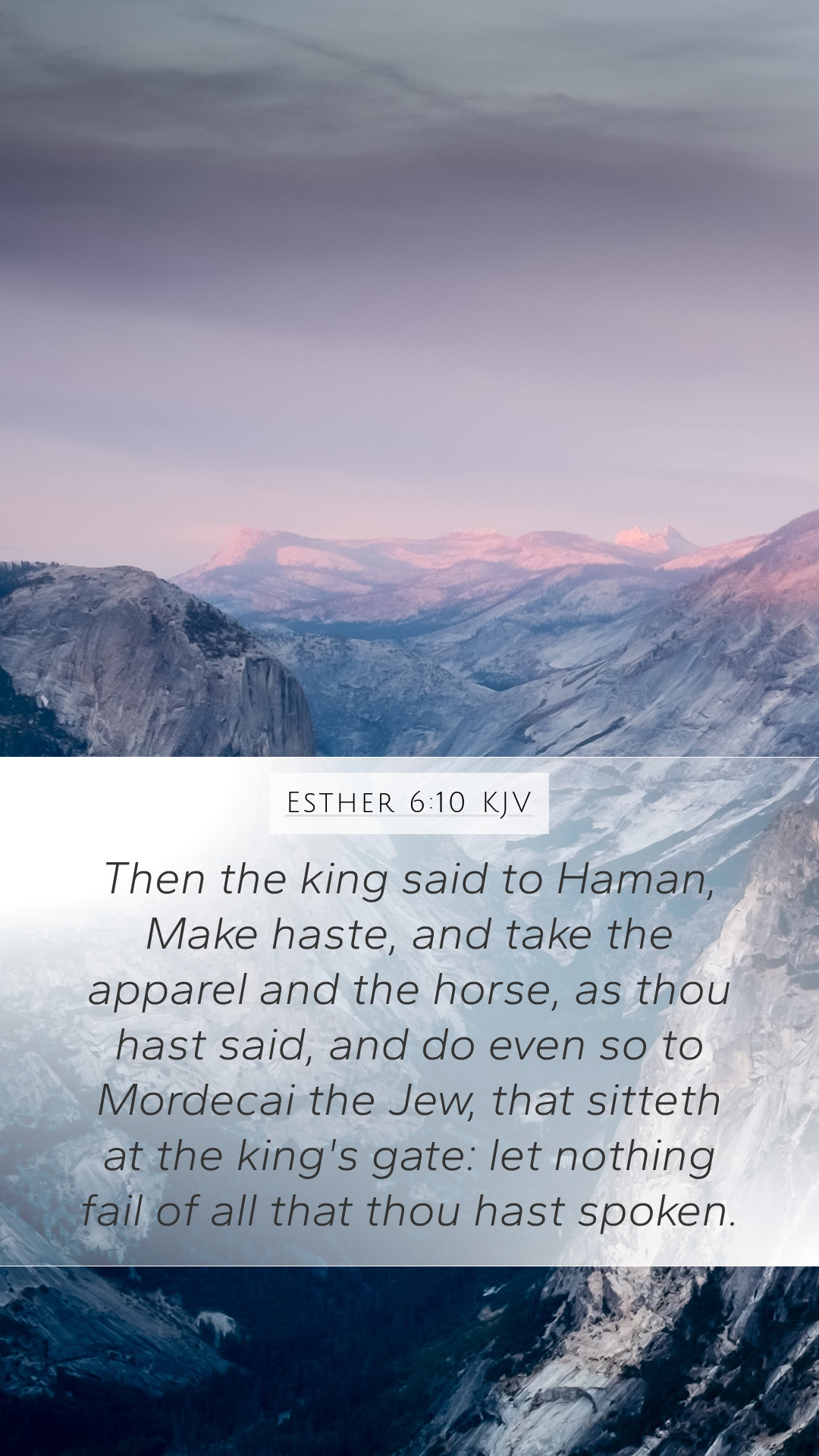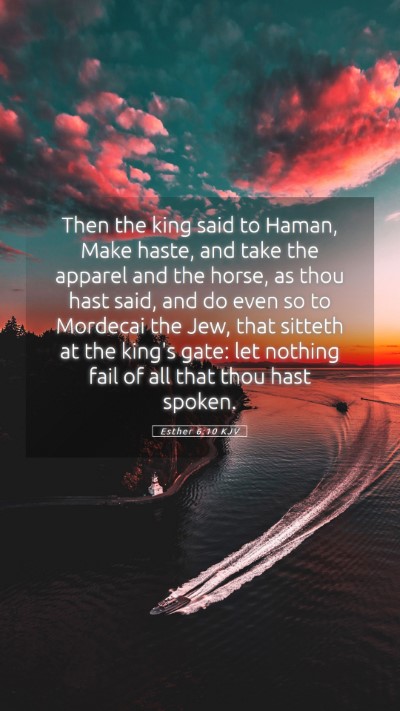Old Testament
Genesis Exodus Leviticus Numbers Deuteronomy Joshua Judges Ruth 1 Samuel 2 Samuel 1 Kings 2 Kings 1 Chronicles 2 Chronicles Ezra Nehemiah Esther Job Psalms Proverbs Ecclesiastes Song of Solomon Isaiah Jeremiah Lamentations Ezekiel Daniel Hosea Joel Amos Obadiah Jonah Micah Nahum Habakkuk Zephaniah Haggai Zechariah MalachiEsther 6:10 Meaning
What is the meaning of Esther 6:10?
Then the king said to Haman, Make haste, and take the apparel and the horse, as thou hast said, and do even so to Mordecai the Jew, that sitteth at the king's gate: let nothing fail of all that thou hast spoken.
Esther 6:10 Bible Verse Meaning
Understanding Esther 6:10
Esther 6:10 states: "Then the king said to Haman, ‘Hurry, take the robes and the horse, as you have said, and do so to Mordecai the Jew, who sits at the king’s gate. Leave out nothing that you have mentioned.’" This verse occurs in a pivotal moment of the narrative, revealing God's providence and the theme of reversal inherent in the story of Esther.
Bible Verse Meanings
The answer to understanding Scripture, particularly this verse, lies in the broader context of the Book of Esther. The mention of Mordecai receiving honor at Haman's hands signifies a tremendous reversal in the fortunes of both figures—Mordecai, once an anonymous Jew seated in the king's gate, is elevated, while Haman, who plotted his demise, finds himself compelled to honor him.
Bible Verse Interpretations
Various commentaries shed light on the deeper implications of Esther 6:10:
- Matthew Henry: Emphasizes that God often raises the humble and brings low the proud. The events show that what Haman intended for evil, God turned for good.
- Albert Barnes: Observes the humiliation of Haman as a key moment that underscores the Lord’s sovereignty and justice.
- Adam Clarke: Points out that these actions are a direct response to Haman's earlier conspiracies against Mordecai, illustrating divine justice at play.
Bible Verse Commentary
This commentary focuses on the unfolding drama where Haman's ambitions lead to his downfall even as he inadvertently fulfills the king’s decree to honor Mordecai. This moment is crucial not only for the characters involved but also for the overarching narrative of redemption and justice.
Scripture Analysis
The significance of this passage can be analyzed in terms of literary structure, character development, and thematic relevance. Haman's degradation juxtaposes his previous plotting, signifying the Biblical principle that pride goes before destruction (Proverbs 16:18).
Biblical Exegesis
Exegesis of Esther 6:10 reveals how God orchestrates events to fulfill His purposes even amidst seemingly mundane or desperate scenarios. The act of Haman leading Mordecai on the king’s horse is steeped in irony, emphasizing the reversal of fortunes that is a hallmark of biblical narratives.
Bible Study Insights
This verse calls Bible study groups to reflect on how God operates through human decisions and actions—even those intended for harm. It serves to inspire believers to trust in God’s timing and justice as they navigate life's challenges.
Key Themes to Explore:
- Divine Providence
- Reversal of Fortunes
- Pride vs. Humility
Meaning of Bible Verses
In terms of meaning, this verse powerfully illustrates how God uses individuals, often in unexpected ways, to bring about His will. The king’s command was not just a casual suggestion but a divine directive leading to a significant plot twist.
Understanding Scripture
As we examine the complexity of Esther 6:10, it highlights the necessity of understanding not merely the surface narrative, but the underlying themes of divine intervention and morality woven throughout Scripture.
Application of Esther 6:10
In applying this verse to daily life, one might consider how their own actions and decisions might contribute to either victory or defeat in their personal experience. Learning humility and recognizing God’s active role in their journey is a practical takeaway for believers today.
Related Bible Cross References
- Proverbs 16:18 - "Pride goes before destruction, and a haughty spirit before a fall."
- Esther 3:6 - Haman’s plot against Mordecai.
- Philippians 2:9-11 - The exaltation of Christ and the concept of honor.
Conclusion
Esther 6:10 captures a moment of divine orchestration where the humble are lifted, and the proud are brought low. It encapsulates the moral lessons embedded in the narrative, emphasizing God's sovereignty and the assurance that justice prevails in His kingdom.


